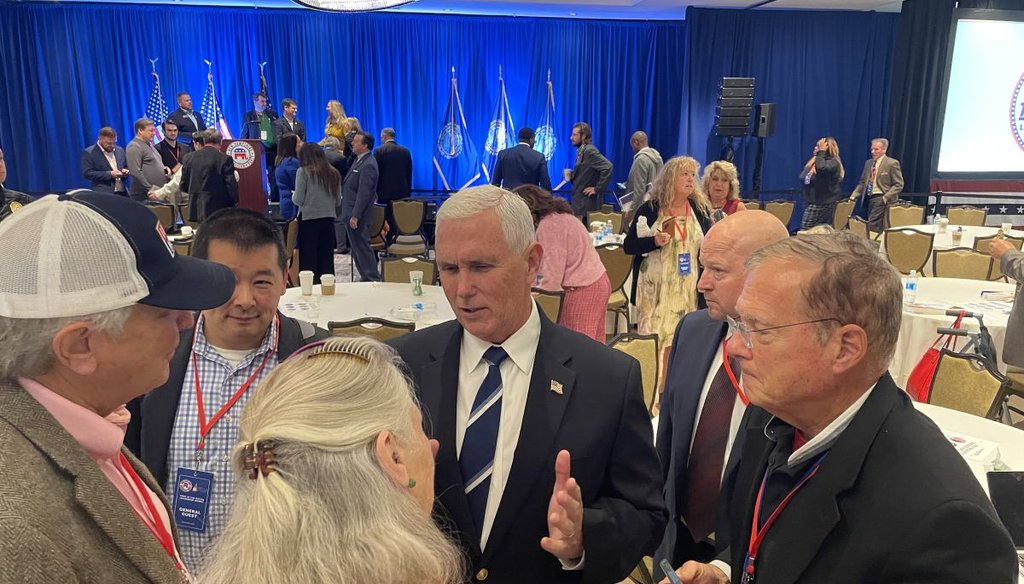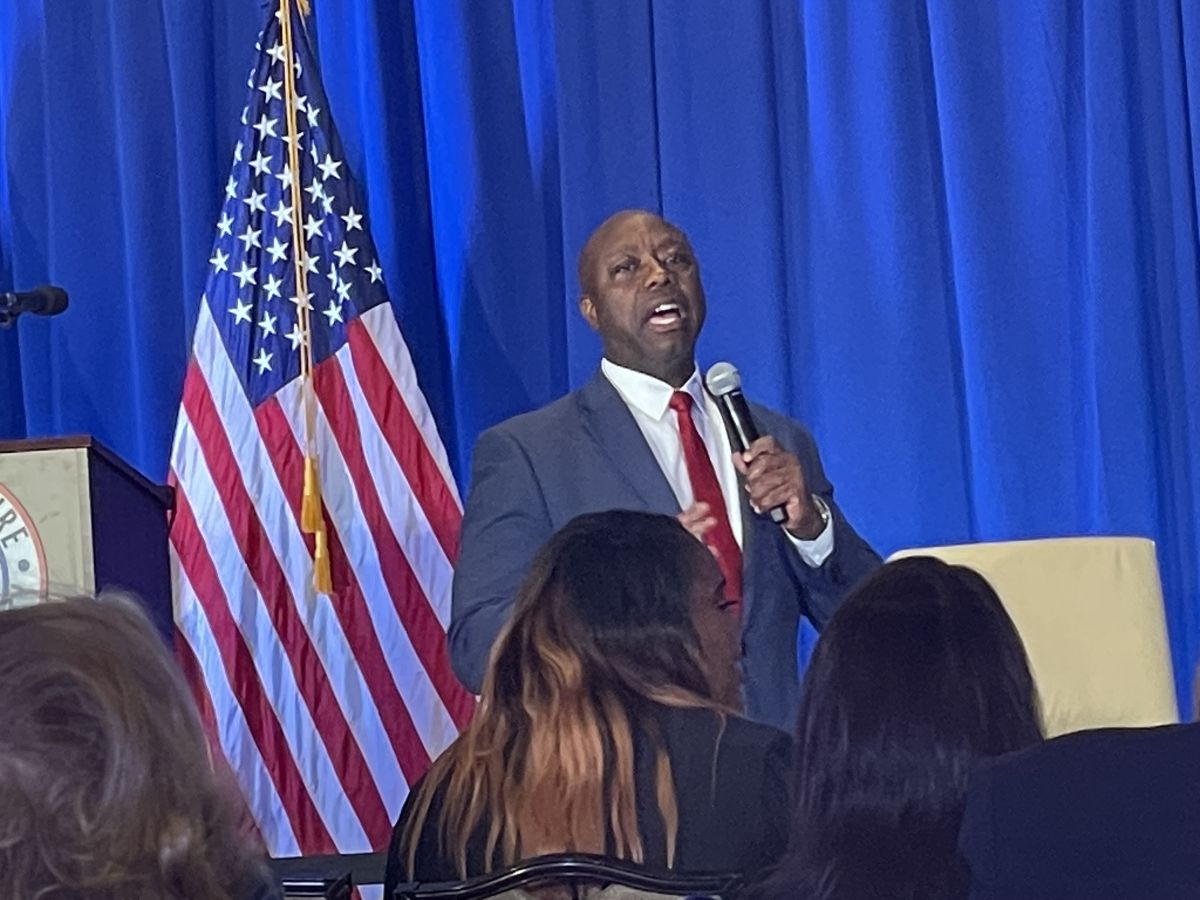Stand up for the facts!
Our only agenda is to publish the truth so you can be an informed participant in democracy.
We need your help.
I would like to contribute

Former Vice President Mike Pence, a Republican presidential candidate, talks with attendees Oct. 14, 2023, at the First in the Nation summit in Nashua, N.H. (Louis Jacobson/PolitiFact)
NASHUA, N.H. — On the closing day of a summit sponsored by the New Hampshire Republican Party, two more presidential candidates — Sen. Tim Scott, R-S.C., and former Vice President Mike Pence — sought support in the crucial early primary state.
Scott and Pence spoke at the First in the Nation Summit in Nashua, delivering 20-minute speeches for an audience packed with party officials and Republican voters.
The only major candidate not to speak was President Donald Trump.
Scott leaned heavily on his personal story, describing growing up in poverty in South Carolina to a single mother who worked long hours as a nurse’s aide. He also described being partly raised by a grandfather who had little formal education.
"I didn't know if the American dream would work for me," he said.
Scott said his upbringing shaped his outlook.
"There's this drug called victimhood that is devastating our country," he said, offering veiled criticism of Trump by saying that "there are people who believe that grievance is our way forward."
Pence focused on curbing federal spending, saying that he — unlike President Joe Biden or Trump — would tackle entitlement spending in programs such as Social Security and Medicare for people younger than 40, suggesting raising the retirement age, means-testing for benefits and letting Americans invest a invest portion of their pay instead of having to pay payroll taxes on it.
Pence said he strongly supports Ukraine’s fight against Russia’s invasion, but the comment received only a trickling of applause. Support for Ukraine divides Republicans across the country.
"If you don't see a growing axis between Iran, Russia, China, and North Korea, you’re just not paying attention," Pence said.
We fact-checked several of the candidates’ claims. Earlier, we fact-checked claims by candidates former New Jersey Gov. Chris Christie, Florida Gov. Ron DeSantis, former South Carolina Gov. Nikki Haley and entrepreneur Vivek Ramaswamy during the summit’s first day.
Sen. Tim Scott, R-S.C., addresses the First in the Nation summit Oct. 14, 2023, in Nashua, N.H. (Louis Jacobson/PolitiFact)
Economy and budget
Pence: "Runaway spending has caused the worst inflation in 40 years."
Inflation did hit 40-year highs, though year-over-year inflation has since fallen near historical norms.
Inflation was under 2% when Biden was inaugurated in January 2021. It then rose sharply, peaking at about 9% in June 2022, which was the highest in about 40 years. It has since fallen to 3.7% for September. That’s much closer to the Federal Reserve Board’s target rate of 2%.
Also, economists say that higher federal spending designed to target the coronavirus pandemic accelerated inflation, but did not cause it; inflation emerged earlier because of supply chain difficulties during the pandemic.
Pence: "75% of federal spending is in entitlements. … (In the House budget battles) they're nickel and diming with about 10% of the budget.
His numbers are in the ballpark.
Entitlements — a type of spending that Congress does not have to reauthorize every year, and that includes Social Security, Medicare and Medicaid benefits paid to older and low-income people and people with disabilities — account for about 67% of federal spending.
The type of spending Congress has to approve annually — which includes funding for federal departments and agencies — amounts to 25.6% of federal spending. About 11.5% of that amount covers defense spending; the other 14% covers spending for everything other than defense.
Pence: "We’re a year away from spending more on the national debt than on national defense."
This outcome is expected during the next few years, not quite as soon as Pence said.
Congressional Budget Office projections from February 2023 show that net interest is projected to exceed defense spending starting in fiscal year 2029.
Scott: "Our current interest-only payment (is) $572 billion, not touching the principal. Interest only."
It’s even higher. For fiscal 2022, the most recent full year, the Office of Management and Budget reported that the U.S. paid almost $661 billion in net interest costs.
Scott: After President Trump's Tax Cuts and Jobs Act was enacted in 2017, "we saw unemployment rates go to the lowest in the history of the country for minorities" and "a 70-year low for women."
The economy is so sprawling that it’s hard to gauge how much the tax cuts factored in reaching those initial lows under Trump. But Scott has a point on the correlative data.
The Black unemployment rate reached a record low of 5.4% in September 2019; the Hispanic rate hit a record low of 4% the same month; and the rate for women reached a 67-year low of 3.4% in February 2020.
The rates have fallen further under Biden. The Black rate fell to 4.7% in April 2023; the Hispanic rate fell to 3.9% in September 2022; and the rate for women fell to 3.3% in April 2023.
Scott: "Biden in his first act passed a $1.9 trillion COVID relief package, and the only thing missing was COVID relief."
This might be a rhetorical exaggeration by Scott, but the package included numerous provisions targeted at reducing COVID-19’s spread.
The 2021 American Rescue Plan clarified that COVID-19 vaccines and administration were covered free for people on Medicaid, and it provided $250 million for states to aid Medicaid-certified nursing facilities with COVID-19 cases among residents or staff, according to KFF, a health policy think tank.
It also included extended unemployment insurance when COVID-19 was keeping some businesses from hiring, and it provided emergency aid to small businesses to rehire or retain workers and to buy the health and sanitation equipment needed to keep workers safe from the virus.
Foreign policy
Scott: The U.S. agreement to trade Iranian hostages in exchange for unfreezing $6 billion in Iranian funds could aid Hamas because "money is fungible."
None of that money would have gone directly to Hamas before it attacked Israel on Oct. 7, because the funds — oil revenue that was frozen in South Korea — has not been disbursed and can be unfrozen only for humanitarian purchases. (The U.S. is considering refreezing the funds because of to the Hamas attack.)
Still, experts say the fungibility argument is plausible.
"The safeguards in place are surely good enough to make sure only legitimate goods are purchased using those funds," said Matthew Levitt, a senior fellow at the Washington Institute for Near East Policy, a Middle East-focused think tank. "But nobody can say what’s then done with those goods."
Matthew Kroenig, a Georgetown University government and foreign service professor, said, "If you had a large end-of-year bonus payment coming your way, might you start spending more money in the meantime? Of course. Money is fungible."
This is especially true in a country with a highly centralized economy and government, Levitt added. The Islamic Revolutionary Guard Corps, an influential military branch within Iran, "controls so much of the Iranian economy, there’s no way to have comfort (that) the goods aren’t sold and some funds go to underwrite militancy."
Our Sources
Please see sources linked in article






































